小学英语句型转换(陈述句变一般疑问句特殊疑问句及练习)92290
小学英语句型转换(陈述句变一般疑问句特殊疑问句及练习)92290讲课讲稿
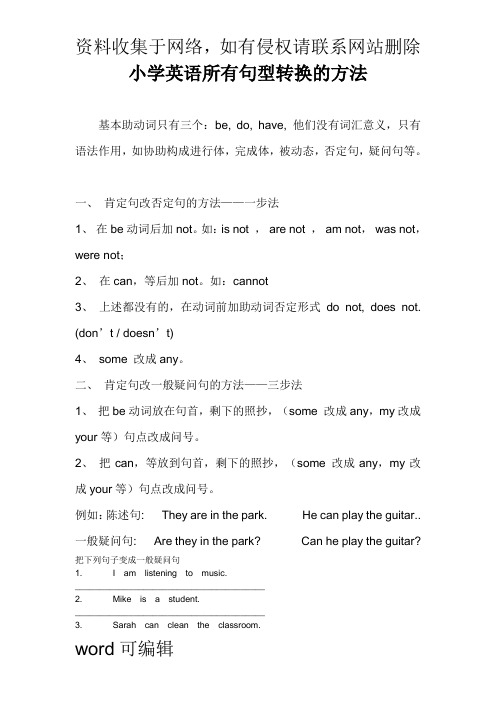
小学英语所有句型转换的方法基本助动词只有三个:be, do, have, 他们没有词汇意义,只有语法作用,如协助构成进行体,完成体,被动态,否定句,疑问句等。
一、肯定句改否定句的方法——一步法1、在be动词后加not。
如:is not ,are not ,am not,was not,were not;2、在can,等后加not。
如:cannot3、上述都没有的,在动词前加助动词否定形式do not, does not. (don’t / doesn’t)4、some 改成any。
二、肯定句改一般疑问句的方法——三步法1、把be动词放在句首,剩下的照抄,(some 改成any,my改成your等)句点改成问号。
2、把can,等放到句首,剩下的照抄,(some 改成any,my改成your等)句点改成问号。
例如:陈述句: They are in the park. He can play the guitar.. 一般疑问句: Are they in the park? Can he play the guitar?把下列句子变成一般疑问句1. I am listening to music._______________________________________2. Mike is a student._______________________________________3. Sarah can clean the classroom.________________________________________4. They are in the zoo.________________________________________5. There are some flowers in the vase.________________________________________6.This is my sister._________________________________________7.We are sweeping the floor.__________________________________________3、上述都没有的,在句首请助动词Do/Does帮忙,剩下的照抄,(some 改成any,my改成your等)句点改成问号。
【史上最强】重点小学英语句型转换(陈述句变一般疑问句特殊疑问句及练习测试)
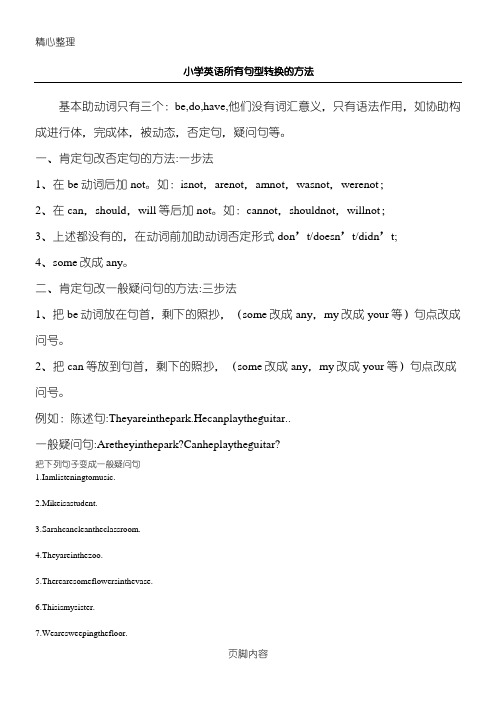
小学英语所有句型转换的方法基本助动词只有三个:be,do,have,他们没有词汇意义,只有语法作用,如协助构成进行体,完成体,被动态,否定句,疑问句等。
一、肯定句改否定句的方法:一步法1、在be动词后加not。
如:isnot,arenot,amnot,wasnot,werenot;2、在can,should,will等后加not。
如:cannot,shouldnot,willnot;3、上述都没有的,在动词前加助动词否定形式don’t/doesn’t/didn’t;4、some改成any。
二、肯定句改一般疑问句的方法:三步法1、把be动词放在句首,剩下的照抄,(some改成any,my改成your等)句点改成问号。
2、把can等放到句首,剩下的照抄,(some改成any,my改成your等)句点改成问号。
例如:陈述句:Theyareinthepark.Hecanplaytheguitar..一般疑问句:Aretheyinthepark?Canheplaytheguitar?把下列句子变成一般疑问句1.Iamlisteningtomusic._______________________________________2.Mikeisastudent._______________________________________3.Sarahcancleantheclassroom.________________________________________4.Theyareinthezoo.________________________________________5.Therearesomeflowersinthevase.________________________________________6.Thisismysister._________________________________________7.Wearesweepingthefloor.__________________________________________3、上述都没有的,在句首请助动词Do/Does/Did帮忙,剩下的照抄,(some改成any,my改成your等)句点改成问号。
小学英语句型转换(陈述句变一般疑问句特殊疑问句及练习)

小学英语所有句型转换的方法基本助动词只有三个:be, do, have, 他们没有词汇意义,只有语法作用,如协助构成进行体,完成体,被动态,否定句,疑问句等。
一、肯定句改否定句的方法——一步法1、在be动词后加not。
如:is not ,are not ,am not,was not,were not;2、在can,等后加not。
如:cannot3、上述都没有的,在动词前加助动词否定形式do not, does not. (don’t/doesn’t)4、some 改成any。
二、肯定句改一般疑问句的方法——三步法1、把be动词放在句首,剩下的照抄,(some 改成any,my改成your等)句点改成问号。
2、把can,等放到句首,剩下的照抄,(some 改成any,my改成your等)句点改成问号。
例如:陈述句: They are in the park. He can play the guitar..一般疑问句: Are they in the park? Can he play the guitar?把下列句子变成一般疑问句1. I am listening to music._______________________________________2. Mike is a student._______________________________________3. Sarah can clean the classroom.________________________________________4. They are in the zoo.________________________________________5. There are some flowers in the vase.________________________________________6.This is my sister._________________________________________7.We are sweeping the floor.__________________________________________3、上述都没有的,在句首请助动词Do/Does帮忙,剩下的照抄,(some 改成any,my改成your等)句点改成问号。
陈述句变一般疑问句特殊疑问句及练习
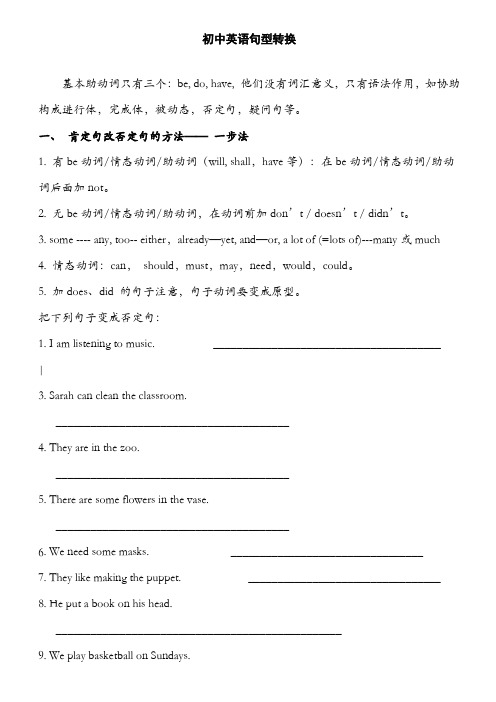
初中英语句型转换基本助动词只有三个:be, do, have, 他们没有词汇意义,只有语法作用,如协助构成进行体,完成体,被动态,否定句,疑问句等。
一、肯定句改否定句的方法——一步法1. 有be动词/情态动词/助动词(will, shall,have等):在be动词/情态动词/助动词后面加not。
2. 无be动词/情态动词/助动词,在动词前加don’t / doesn’t / didn’t。
3. some ---- any,too-- either,already—yet, and—or, a lot of (=lots of)---many或much4. 情态动词:can,should,must,may,need,would,could。
5. 加does、did 的句子注意,句子动词要变成原型。
把下列句子变成否定句:1. I am listening to music. _______________________________________|3. Sarah can clean the classroom.________________________________________4. They are in the zoo.________________________________________5. There are some flowers in the vase.________________________________________6. We need some masks. _________________________________7. They like making the puppet. _________________________________8. He put a book on his head._________________________________________________9. We play basketball on Sundays._________________________________________________10. Tom likes listening to music____________________________________________二、肯定句改一般疑问句的方法——三步法1. 有be动词/情态动词/助动词:把be动词/情态动词/助动词提到句首,其余照抄,some---any(但是,若在表示请邀请、请求的句子中,some可以不变),too-- either,already—yet, and—or, my---your,I /we---you, our—your 句末用问号。
小学生英语句型转换练习题

小学生英语句型转换练习题### 小学英语句型转换练习题题目一:一般疑问句转换1. 原句:I am a student.- 转换:Are you a student?2. 原句:She has a cat.- 转换:Does she have a cat?3. 原句:They play soccer on weekends.- 转换:Do they play soccer on weekends?题目二:特殊疑问句转换1. 原句:My father works in a bank.- 转换:Where does your father work?2. 原句:We usually have lunch at twelve.- 转换:What time do you usually have lunch?3. 原句:The new movie is very interesting.- 转换:How is the new movie?题目三:否定句转换1. 原句:I like apples.- 转换:I don't like apples.2. 原句:She can swim.- 转换:She can't swim.3. 原句:They are at home.- 转换:They are not at home.题目四:陈述句转换为一般疑问句1. 原句:The cat is under the table.- 转换:Is the cat under the table?2. 原句:He is doing his homework.- 转换:Is he doing his homework?3. 原句:We are going to the park tomorrow.- 转换:Are you going to the park tomorrow? 题目五:陈述句转换为否定句1. 原句:She watches TV every evening.- 转换:She doesn't watch TV every evening.2. 原句:They are playing basketball.- 转换:They are not playing basketball.3. 原句:I have a new book.- 转换:I don't have a new book.题目六:反意疑问句1. 原句:He is a good student, isn't he?- 转换:He isn't a good student, is he?2. 原句:She can speak English, can't she?- 转换:She can't speak English, can she?3. 原句:They are going to the concert, aren't they?- 转换:They aren't going to the concert, are they?题目七:被动语态转换1. 原句:We make the cake.- 转换:The cake is made by us.2. 原句:They clean the room.- 转换:The room is cleaned by them.3. 原句:She writes a letter.- 转换:A letter is written by her.题目八:条件句转换1. 原句:If it rains, we will stay at home.- 转换:We will stay at home if it rains.2. 原句:If she has time, she will help us.- 转换:She will help us if she has time.3. 原句:If they finish their homework, they can go out. - 转换:They can go out if they finish their homework.通过这些练习题,小学生可以更好地掌握英语句型的转换,提高语言运用的灵活性和准确性。
句型转换(陈述句变一般疑问句特殊疑问句及练习)

初中英语句型转换一、肯定句改否定句的方法——一步法1. 有be动词/情态动词:在be动词/情态动词后后加not。
2. 无be动词/情态动词,在动词前加don’t / doesn’t / didn’t。
3. 肯定句中的some 改成any。
4. Be动词am, is , are . 情态动词:can,will,should,must,may。
练习~~~把下列句子变成否定句:1. I am listening to music. _______________________________________2. Mike is a student. _______________________________________3. Sarah can clean the classroom. _______________________________________4. They are in the zoo. _______________________________________5. There are some flowers in the vase. _______________________________________6. This is my sister. _______________________________________7. We are sweeping the floor. ___________________________8. We need some masks. _________________________________9. They like making the puppet. _________________________________10. Su Hai and Su Yang live in a new house.______________________________________________11. I put a book on my head. _________________________________________________12. They sing “In the classroom” together. _______________________________________________13. We play basketball on Sundays. _________________________________________________14. Tom likes listening to music. ____________________________________________15. We go to school on Sunday. _________________________________________________16. His father works hard. _________________________________________________17. Alice will go to the Summer Palace. ____________________________________________18. You should study hard for yourself . __________________________________________二、肯定句改一般疑问句的方法——三步法1. 有be动词/情态动词:be动词/情态动词提到句首,其余照抄,(some改any,my改your)句末用问号。
句型转换(陈述句变一般疑问句特殊疑问句及练习)

初中英语句型转换【2 】一. 肯定句改否认句的办法——一步法1. 有be动词/情态动词:在be动词/情态动词后后加not.2. 无be动词/情态动词,在动词前加don’t/doesn’t/didn’t.3. 肯定句中的some 改成any.4. Be动词 am, is , are . 情态动词:can,will,should,must,may.~~~把下列句子变成否认句:1. I am listening to music._______________________________________2. Mike isastudent._______________________________________3. Sarah cancleantheclassroom._______________________________________4. They areinthezoo._______________________________________5. There are some flowers in the vase._______________________________________6.This is my sister._______________________________________7.We aresweepingthefloor.___________________________8. We need some masks._________________________________9. They like making the puppet._________________________________10. Su Hai and Su Yang live in a new house.______________________________________________11.I put a book on my head._________________________________________________12. They sing “In the classroom”together._______________________________________________13.We play basketball on Sundays._________________________________________________14. Tomlikeslisteningtomusic. ____________________________________________15. We go to school on Sunday. _________________________________________________16. His father works hard. _________________________________________________17. Alice will go to the Summer Palace. ____________________________________________18. You should study hard for yourself . __________________________________________二. 肯定句改一般疑问句的办法——三步法1. 有be动词/情态动词:be动词/情态动词提到句首,其余照抄,(some改any,my改your)句末用问号.2. 无be动词/情态动词,在句首加Do/Does/Did,其余照抄,(some改any,my改your)句末用问号.3. 加does.did 的句子留意,句子动词要变成原型.例如:陈述句: They are in the park. He can play the guitar..一般疑问句: Are they in the park? Can he play the guitar?陈述句: I like the ducks. He likes the dogs.一般疑问句:Do you like the ducks? Does he like the dogs?1. I am listening to music.______________________________________2. Mike is a student._______________________________________3. Sarah can clean the classroom.________________________________________4. They are in the zoo.________________________________________5. There are some flowers in the vase.___________________________________6.This is my sister._________________________________________7.We are sweeping the floor.__________________________________________8. We need some masks._________________________________9. They like making the puppet._________________________________10. Su Hai and Su Yang live in a new house.______________________________________11.I put a book on my head._________________________________________________12. They sing “In the classroom”together.______________________________________13.We play basketball on Sundays.______________________________________________14. Tom likes listening to music. _______________________________________三. 肯定句改特别疑问句的办法——四步法关于特别疑问词问人(谁) who地点(何地) where时光(何时) when.what time器械/职业/事物(什么) what方法办法程序身材(如何)how原因 why哪一个which年纪 how old..怎么样(提建议)How about 若干钱 How much谁的whose (book, pen…)问礼拜what day问日期what date问数目若干 (可数名词) How many(people…)问数目(不可数名词)How much(water…)色彩 what color班级 what class年级what grade1.在一般疑问句的基本上,句首添加一个疑问词即可,可依据划线部分肯定是什么疑问词.2.接着找be动词或can,shall, will等放在疑问词后面,若没有则请助动词do/does/did帮忙,写在疑问词后面,how many除外,必须先写物品,再写be动词等.3.划线部分去失落后剩下的内容照抄,(some 改成any,my改成your等)4.句点改成问号.1.A: _______ is the boy in blue? B:He’s Mike.2.A: _______pen is it? B:It’s mine.3.A: _______ is the diary? B:It’s under the chair.4.A: _______ is the Christmas Day? B: It’s on the 25th of December.5.A: _______ are the earphones? B:They are 25 Yuan.6.A: _______ is the cup? B:It’s blue.7.A: _______ is it today? B:It’s Sunday.8.A: _______ was it yesterday? B: It was the 13th of October.9.A: _______ this red one? B:It’s beautiful.10.A:_______ is your cousin? B: He’s 15 years old.11.A:_______ do you have dinner? B: At 6 o’clock.1.The children have a good time in the park.否认句:__________________________________________一般疑问句:________________________________________对划线部分提问:____________________________________2. There are about nine hundred people at the concert.(音乐会)否认句:__________________________________________一般疑问句:________________________________________对划线部分提问:____________________________________3. There is only one problem.否认句:__________________________________________一般疑问句:________________________________________肯定/否认答复:____________________________________4. Ann does her homeworkevery evening.否认句:__________________________________________ 一般疑问句:________________________________________ 对划线部分提问:____________________________________ 5. I read an English book every day.否认句:__________________________________________ 一般疑问句:________________________________________ 肯定/否认答复:____________________________________ 对划线部分提问:____________________________________ 6. My brother isin the park now.否认句:__________________________________________ 一般疑问句:________________________________________ 肯定/否认答复:____________________________________ 对划线部分提问:____________________________________ 7. She has some bread for lunch today.否认句:__________________________________________ 一般疑问句:________________________________________ 肯定/否认答复:____________________________________ 对划线部分提问:____________________________________ 8. They read Englishevery day.否认句:__________________________________________ 一般疑问句:________________________________________ 肯定/否认答复:____________________________________ 对划线部分提问:____________________________________。
小学英语句型转换(陈述句变一般疑问句特殊疑问句及练习)
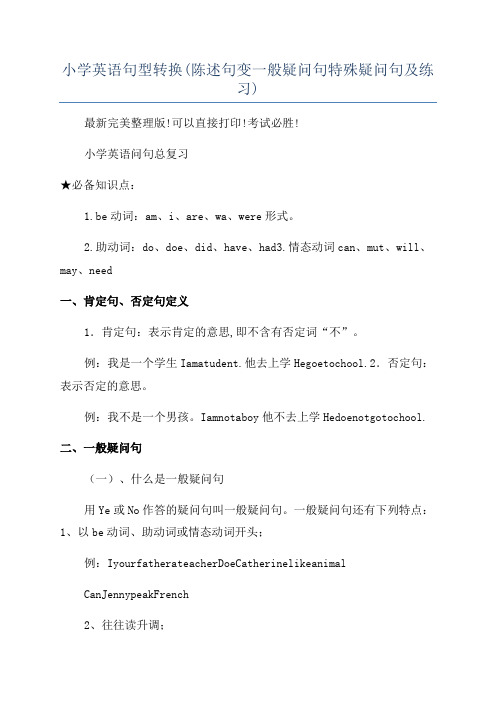
小学英语句型转换(陈述句变一般疑问句特殊疑问句及练习)最新完美整理版!可以直接打印!考试必胜!小学英语问句总复习★必备知识点:1.be动词:am、i、are、wa、were形式。
2.助动词:do、doe、did、have、had3.情态动词can、mut、will、may、need一、肯定句、否定句定义1.肯定句:表示肯定的意思,即不含有否定词“不”。
例:我是一个学生Iamatudent.他去上学Hegoetochool.2.否定句:表示否定的意思。
例:我不是一个男孩。
Iamnotaboy他不去上学Hedoenotgotochool.二、一般疑问句(一)、什么是一般疑问句用Ye或No作答的疑问句叫一般疑问句。
一般疑问句还有下列特点:1、以be动词、助动词或情态动词开头;例:IyourfatherateacherDoeCatherinelikeanimalCanJennypeakFrench2、往往读升调;3、译成汉语,都可以带上“吗”,例如上面三句可分别译为:你父亲是老师吗?凯瑟琳喜欢动物吗?詹妮会说法语吗?★(二)、如何将陈述句变成一般疑问句?要将陈述句变成一般疑问句,可以遵循下列步骤:1.看句中有没有be动词(am、i、are、wa、were)、助动词(do、doe、did、have、had)或情态动词(can、mut、will、may等),如果有,将其提到句首,句末打上问号即可。
例:Itwarainyyeterday.→Waitrainyyeterday Tom'fathercanplaythepiano.→CanTom'fatherplaythepianoIhavefi nihedmyhomework.→Haveyoufinih edyourhomework2.如果句中没有be动词、助动词或情态动词,则根据谓语动词的形式借助do的相应形式放在句首。
具体方法是:如果谓语动词是原形,则借do;如果谓语动词是一般现在时第三人称单数形式,则借doe;如果谓语动词是过去式,则借did.需要注意的是,借doe或例:Theygotochoolbybike.→DotheygotochoolbybikeBillgetupat6:30everyday.→Doebillgetupat6:30everydayThetudentawafilmyet erday.→Didthetudenteeafilmyeterday★(三).陈述句变一般疑问句应注意的事项陈述句变成一般疑问句除了遵循上述规则以外,还应注意下列几点:1.如果陈述句中有第一人称,则变问句时最好要变为第二人称。
(完整版)句型转换(陈述句变一般疑问句特殊疑问句及练习)
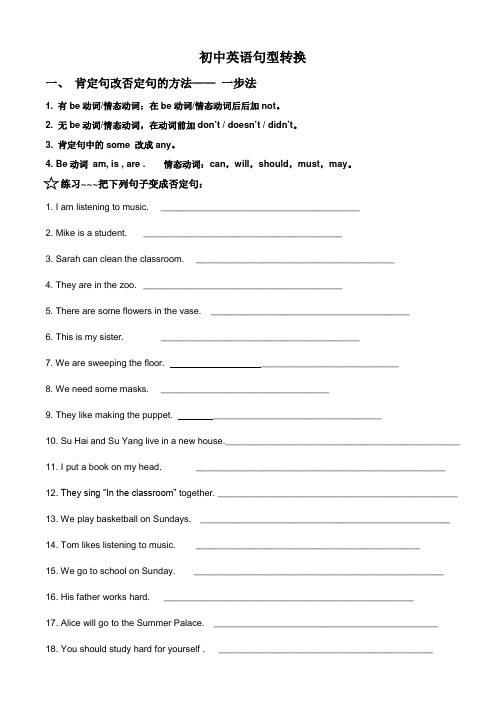
初中英语句型转换一、肯定句改否定句的方法——一步法1. 有be动词/情态动词:在be动词/情态动词后后加not。
2. 无be动词/情态动词,在动词前加don’t / doesn’t / didn’t。
3. 肯定句中的some 改成any。
4. Be动词am, is , are . 情态动词:can,will,should,must,may。
练习~~~把下列句子变成否定句:1. I am listening to music. _______________________________________2. Mike is a student. _______________________________________3. Sarah can clean the classroom. _______________________________________4. They are in the zoo. _______________________________________5. There are some flowers in the vase. _______________________________________6. This is my sister. _______________________________________7. We are sweeping the floor. ___________________________8. We need some masks. _________________________________9. They like making the puppet. _________________________________10. Su Hai and Su Yang live in a new house.______________________________________________11. I put a book on my head. _________________________________________________12. They sing “In the classroom” together. _______________________________________________13. We play basketball on Sundays. _________________________________________________14. Tom likes listening to music. ____________________________________________15. We go to school on Sunday. _________________________________________________16. His father works hard. _________________________________________________17. Alice will go to the Summer Palace. ____________________________________________18. You should study hard for yourself . __________________________________________1. 有be动词/情态动词:be动词/情态动词提到句首,其余照抄,(some改any,my改your)句末用问号。
句型转换(陈述句变一般疑问句特殊疑问句及练习)

初中英语句型转换一、肯定句改否定句的方法——一步法1. 有be动词/情态动词:在be动词/情态动词后后加not。
2. 无be动词/情态动词,在动词前加don’t / doesn’t / didn’t。
3. 肯定句中的some 改成any。
4. Be动词am, is , are . 情态动词:can,will,should,must,may。
练习~~~把下列句子变成否定句:1. I am listening to music. _______________________________________2. Mike is a student. _______________________________________3. Sarah can clean the classroom. _______________________________________4. They are in the zoo. _______________________________________5. There are some flowers in the vase. _______________________________________6. This is my sister. _______________________________________7. We are sweeping the floor. ___________________________8. We need some masks. _________________________________9. They like making the puppet. _________________________________10. Su Hai and Su Yang live in a new house.______________________________________________11. I put a book on my head. _________________________________________________12. They sing “In the classroom” together. _______________________________________________13. We play basketball on Sundays. _________________________________________________14. Tom likes listening to music. ____________________________________________15. We go to school on Sunday. _________________________________________________16. His father works hard. _________________________________________________17. Alice will go to the Summer Palace. ____________________________________________18. You should study hard for yourself . __________________________________________二、肯定句改一般疑问句的方法——三步法1. 有be动词/情态动词:be动词/情态动词提到句首,其余照抄,(some改any,my改your)句末用问号。
句型转换(陈述句变一般疑问句特殊疑问句及练习)
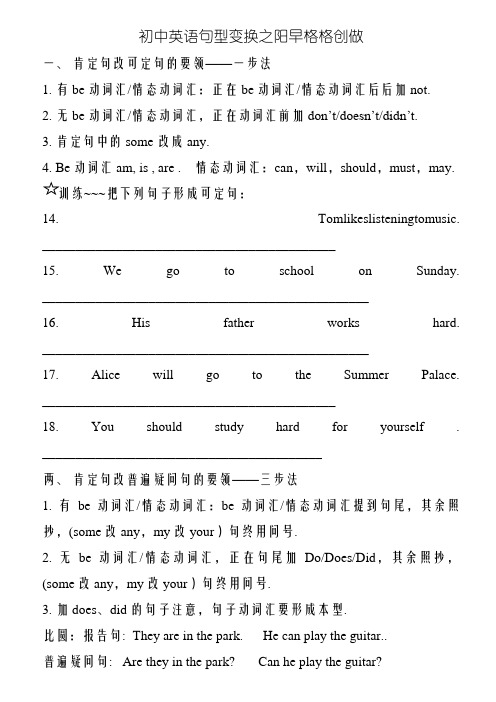
初中英语句型变换之阳早格格创做一、肯定句改可定句的要领——一步法1. 有be动词汇/情态动词汇:正在be动词汇/情态动词汇后后加not.2. 无be动词汇/情态动词汇,正在动词汇前加don’t/doesn’t/didn’t.3. 肯定句中的some 改成any.4. Be动词汇 am, is , are . 情态动词汇:can,will,should,must,may.~~~把下列句子形成可定句:14. Tomlikeslisteningtomusic. ____________________________________________15. We go to school on Sunday. _________________________________________________16. His father works hard. _________________________________________________17. Alice will go to the Summer Palace. ____________________________________________18. You should study hard for yourself . __________________________________________两、肯定句改普遍疑问句的要领——三步法1. 有be动词汇/情态动词汇:be动词汇/情态动词汇提到句尾,其余照抄,(some改any,my改your)句终用问号.2. 无be动词汇/情态动词汇,正在句尾加Do/Does/Did,其余照抄,(some改any,my改your)句终用问号.3. 加does、did 的句子注意,句子动词汇要形成本型.比圆:报告句: They are in the park. He can play the guitar..普遍疑问句: Are they in the park? Can he play the guitar?报告句: I like the ducks. He likes the dogs.普遍疑问句:Do you like the ducks? Does he like the dogs?14. Tom likes listening to music._______________________________________三、肯定句改特殊疑问句的要领——四步法闭于特殊疑问词汇问人(谁) who天面(何天)where时间(何时)when、what time东西/工做/实物(什么) what办法要领步调身体(何如)how本果 why哪一个which年龄 how old..怎么样(提修议)How about几钱 How much谁的whose (book, pen…)问星期what day问日期what date问数量几(可数名词汇) How many(people…)问数量(不可数名词汇)How much (water…)颜色 what color班级 what class年级 what grade1、正在普遍疑问句的前提上,句尾增加一个疑问词汇即可,可根据划线部分决定是什么疑问词汇.2、交着找be动词汇或者can,shall, will等搁正在疑问词汇后里,若不则请帮动词汇do/does/did帮手,写正在疑问词汇后里,how many除中,必须先写东西,再写be动词汇等.3、划线部分来掉后剩下的实质照抄,(some 改成any,my改成your等)4、句面改成问号.1、A: _______ is the boy in blue? B:He’s Mike.2、A: _______pen is it? B:It’s mine.3、A: _______ is the diary? B:It’s under the chair.4、A: _______ is the Christmas Day? B: It’s on the 25th of December.5、A: _______ are the earphones? B:They are 25 Yuan.6、A: _______ is the cup? B:It’s blue.7、A: _______ is it today? B:It’s Sunday.8、A: _______ was it yesterday? B: It was the 13th of October.9、A: _______ this red one? B:It’s beautiful.10.A:_______ is your cousin? B: He’s 15 years old.11、A:_______ do you have dinner? B: At 6 o’clock.1.The children have a good time in the park.可定句:_______________________________________ ___普遍疑问句:_______________________________________ _对于划线部分提问:____________________________________2. There are about nine hundred people at the concert.(音乐会)可定句:_______________________________________ ___普遍疑问句:_______________________________________ _对于划线部分提问:____________________________________3. There is only one problem.可定句:______________________________________ ____普遍疑问句:______________________________________ __肯定/可定回问:____________________________________4. Ann does her homeworkevery evening.可定句:______________________________________ ____普遍疑问句:______________________________________ __对于划线部分提问:____________________________________5. I read an English book every day.可定句:______________________________________ ____普遍疑问句:________________________________________肯定/可定回问:____________________________________ 对于划线部分提问:____________________________________6. My brother isin the park now.可定句:______________________________________ ____普遍疑问句:______________________________________ __肯定/可定回问:____________________________________ 对于划线部分提问:____________________________________7. She has some bread for lunch today.可定句:______________________________________ ____普遍疑问句:______________________________________ __肯定/可定回问:____________________________________ 对于划线部分提问:____________________________________8. They read Englishevery day.可定句:______________________________________ ____普遍疑问句:______________________________________ __肯定/可定回问:____________________________________ 对于划线部分提问:____________________________________。
小学英语句型转换(陈述句变一般疑问句特殊疑问句及练习)
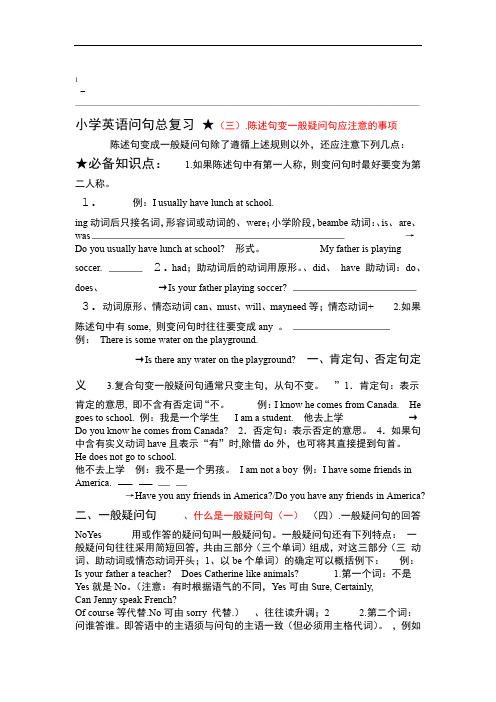
1小学英语问句总复习★(三).陈述句变一般疑问句应注意的事项陈述句变成一般疑问句除了遵循上述规则以外,还应注意下列几点:★必备知识点: 1.如果陈述句中有第一人称,则变问句时最好要变为第二人称。
1.例:I usually have lunch at school.ing动词后只接名词,形容词或动词的、were;小学阶段,beambe动词:、is、are、was→Do you usually have lunch at school? 形式。
My father is playing soccer. 2. had;助动词后的动词用原形。
、did、have 助动词:do、does、→Is your father playing soccer?3.动词原形、情态动词can、must、will、mayneed等;情态动词+ 2.如果陈述句中有some, 则变问句时往往要变成any 。
例:There is some water on the playground.→Is there any water on the playground? 一、肯定句、否定句定义 3.复合句变一般疑问句通常只变主句,从句不变。
”1.肯定句:表示肯定的意思, 即不含有否定词“不。
例:I know he comes from Canada. He goes to school. 例:我是一个学生I am a student. 他去上学→Do you know he comes from Canada? 2.否定句:表示否定的意思。
4.如果句中含有实义动词have且表示“有”时,除借do外,也可将其直接提到句首。
He does not go to school.他不去上学例:我不是一个男孩。
I am not a boy 例:I have some friends in America.→Have you any friends in America?/Do you have any friends in America?二、一般疑问句、什么是一般疑问句(一)(四).一般疑问句的回答NoYes 用或作答的疑问句叫一般疑问句。
小学英语句型转换(陈述句变一般疑问句特殊疑问句及练习)92290
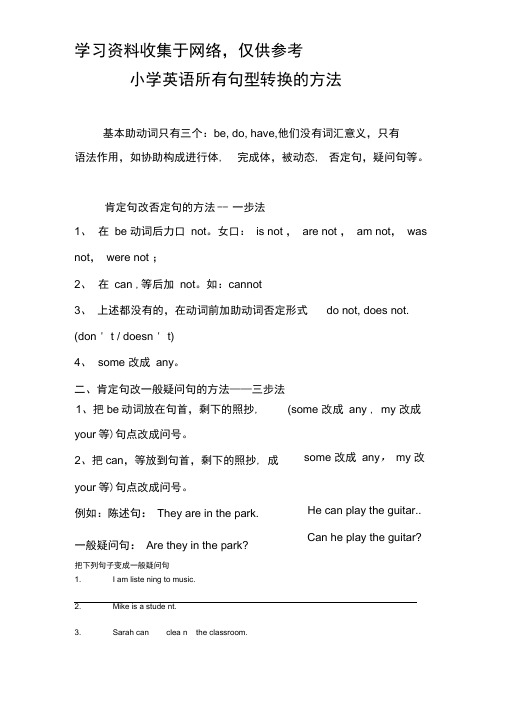
学习资料收集于网络,仅供参考小学英语所有句型转换的方法基本助动词只有三个:be, do, have,他们没有词汇意义,只有肯定句改否定句的方法 -- 一步法1、 在 be 动词后力口 not 。
女口: is not , are not , am not , was not , were not ;2、 在 can ,等后加 not 。
如:cannot3、 上述都没有的,在动词前加助动词否定形式 do not, does not.(don ' t / doesn ' t) 4、 some 改成 any 。
二、肯定句改一般疑问句的方法——三步法your 等)句点改成问号。
2、把can ,等放到句首,剩下的照抄, 成your 等)句点改成问号。
例如:陈述句: They are in the park. 一般疑问句: Are they in the park?把下列句子变成一般疑问句 1. I am liste ning to music. 2. Mike is a stude nt. 3.Sarah canclea n the classroom.语法作用,如协助构成进行体, 完成体,被动态, 否定句,疑问句等。
1、把be 动词放在句首,剩下的照抄, (some 改成 any , my 改成some 改成 any , my 改He can play the guitar.. Can he play the guitar?学习资料3、上述都没有的,在句首请助动词Do/Does帮忙,剩下的照抄, (some 改成any,my 改成your等)句点改成问号。
例如:陈述句:I like the ducks. He likes the dogs.一般疑问句:Do you like the ducks? Does he like the dogs? 把下列句子改为一般疑问句。
1. We n eed some masks.2. They like making the puppet.3. Su Hai and Su Yang live in a new house.4.I put a book on my head.5. They sing "In the classroom ” together.6. We play basketball on Sun days.7. Tom likes liste ning to music三、肯定句改特殊疑问句的方法----- 四步法1、在一般疑问句的基础上,句首添加一个疑问词即可,可根据划线部分确定是什么疑问词。
句型转换(陈述句变一般疑问句特殊疑问句及练习)

初中英语句型转换【1】一、肯定句改否定句的方法——一步法1. 有be动词/情态动词:在be动词/情态动词后后加not。
2. 无be动词/情态动词,在动词前加don’t/doesn’t/didn’t。
3. 肯定句中的some 改成any。
4. Be动词 am, is , are . 情态动词:can,will,should,must,may。
~~~把下列句子变成否定句:1. I am listening to music._______________________________________2. Mike isastudent._______________________________________3. Sarah cancleantheclassroom._______________________________________4. They areinthezoo._______________________________________5. There are some flowers in the vase._______________________________________6.This is my sister._______________________________________7.We aresweepingthefloor.___________________________8. We need some masks._________________________________9. They like making the puppet._________________________________10. Su Hai and Su Yang live in a new house.______________________________________________11.I put a book on my head._________________________________________________12. They sing “In the classroom”together._______________________________________________13.We play basketball on Sundays._________________________________________________14. Tomlikeslisteningtomusic. ____________________________________________15. We go to school on Sunday. _________________________________________________16. His father works hard. _________________________________________________17. Alice will go to the Summer Palace. ____________________________________________18. You should study hard for yourself . __________________________________________二、肯定句改一般疑问句的方法——三步法1. 有be动词/情态动词:be动词/情态动词提到句首,其余照抄,(some改any,my改your)句末用问号。
小学英语句型转换练习题

小学英语句型转换练习题一、陈述句与特殊疑问句转换1. She is playing the piano.→ What is she doing?2. They are eating ice cream.→ What are they doing?3. He likes basketball.→ What does he like?4. We have a test tomorrow.→ When do we have a test?5. Amy has a cute dog.→ What does Amy have?二、一般疑问句与特殊疑问句转换1. You can swim, can't you?→ Can you swim?2. They have finished their homework, haven't they?→ Have they finished their homework?3. She is going to the party, isn't she?→ Is she going to the party?4. He was reading a book, wasn't he?→ Was he reading a book?5. We have seen the movie, haven't we?→ Have we seen the movie?三、肯定句与否定句转换1. She likes apples.→ She doesn't like apples.2. They can skate.→ They can't skate.3. He will go to school tomorrow.→ He won't go to school tomorrow.4. We had lunch at the restaurant.→ We didn't have lunch at the restaurant.5. I am doing my homework.→ I am not doing my homework.四、选择疑问句与特殊疑问句转换1. Is he going to the park or the zoo?→ Where is he going?2. Does she want an apple or an orange?→ What does she want?3. Did they watch a movie or play games?→ What did they do?4. Are you going to the party or staying at home?→ What are you doing?5. Will they have pizza or pasta for dinner?→ What will they have for dinner?五、改写句子类型1. He is running fast. (改为感叹句)→ How fast he is running!2. They are playing soccer. (改为一般疑问句)→ Are they playing soccer?3. She plays the guitar every day. (改为否定句)→ She doesn't play the guitar every day.4. We went to the beach last summer. (改为特殊疑问句)→ When did we go to the beach?5. I will help you with your homework. (改为选择疑问句)→ Will I help you with your homework or not?六、完成对话A: Hello, can I help you?B: Yes, I'm looking for a book about science.A: (1) ________________?B: I need it for my science project.A: (2) ________________?B: Sure, I have a library card.A: Great. (3) ________________?B: Hmm, I'm not sure. Can you recommend a popular one?A: (4) ________________. It's very informative and easy to understand. B: That sounds perfect. Thank you!A: (5) ________________.B: Bye!(1) What are you looking for?(2) Do you have a library card?(3) Do you know any specific book?(4) I recommend "Science Explained".(5) You're welcome.。
小学英语句型转换(陈述句变一般疑问句特殊疑问句及练习)

小学英语句型转换(陈述句变一般疑问句特殊疑问句及练习)最新完美整理版!可以直接打印!考试必胜!小学英语问题综述★必备知识点:Be动词:am,is,are,was,were形式。
2.助动词:do、does、did、have、had3.情态动词can、must、will、may、need一、肯定句和否定句的定义1.肯定句:表示肯定的意思,即不含有否定词“不”。
2.我是一名学生,他上学去了。
否定句:它的意思是否定的。
例:我不是一个男孩。
iamnotaboy他不去上学hedoesnotgotoschool.2、一般疑问句(一)、什么是一般疑问句回答为是或否的问题称为一般问题。
一般疑问句还具有以下特点:1。
它们以be动词、助动词或情态动词开头;例:isyourfatherateacher?doescatherinelikeanimals?堪培拉?2、往往读升调;3.翻译成中文,你可以带上“do”,例如,上面三句话可以翻译成:你父亲是老师吗?凯瑟琳喜欢搬家物吗?詹妮会说法语吗?★ (2). 如何把陈述句变成一般疑问句?要将陈述句变成一般疑问句,可以遵循下列步骤:1.看句中有没有be动词(am、is、are、was、were)、助动词(do、does、did、have、had)或情态动词(can、must、will、may等),如果有,将其提到句首,句末打上问号即可。
例:itwasrainyyesterday.→wasitrainyyesterday?汤姆的父亲正在给皮亚诺付款。
→坎托姆的舞者在玩皮亚诺?我已经完成了家庭工作。
→你完成作业了吗?2.如果句中没有be动词、助动词或情态动词,则根据谓语动词的形式借助do的相应形式放在句子的开头。
具体方法是:如果谓语动词是原形,借用do;如果谓语动词是一般现在时的第三人称单数形式,则borrow是;如果谓语动词是过去时,那么应该注意借用是做还是做例:theygotoschoolbybike.→dotheygotoschoolbybike?每天6:30。
句型转换陈述句变一般疑问句特殊疑问句及练习

初中英语句型变换一、必定句改否定句的方法——一步法1.有 be 动词 / 神情动词:在 be 动词 / 神情动词后后加 not 。
2.无 be 动词 / 神情动词,在动词前加 don’t/doesn ’ t/didn ’ t 。
3.必定句中的 some改成 any。
4.Be 动词 am,is,are.神情动词:can,will,should,must,may。
练习 ~~~把以下句子变成否定句:1.Iamlisteningtomusic._______________________________________2.Mikeisastudent. _______________________________________3.Sarahcancleantheclassroom._______________________________________4.Theyareinthezoo._______________________________________6.Thisismysister._______________________________________9.Theylikemakingthepuppet._________________________________11.Iputabookonmyhead._________________________________________________12.Theysing “Intheclassroom ”13.WeplaybasketballonSundays._________________________________________________14.Tomlikeslisteningtomusic.____________________________________________二、必定句改一般疑问句的方法——三步法1. 有 be 动词 / 神情动词: be 动词 / 神情动词提到句首,其余照抄,(some 改 any,my改 your )句末用问号。
- 1、下载文档前请自行甄别文档内容的完整性,平台不提供额外的编辑、内容补充、找答案等附加服务。
- 2、"仅部分预览"的文档,不可在线预览部分如存在完整性等问题,可反馈申请退款(可完整预览的文档不适用该条件!)。
- 3、如文档侵犯您的权益,请联系客服反馈,我们会尽快为您处理(人工客服工作时间:9:00-18:30)。
小学英语所有句型转换的方法基本助动词只有三个:be, do, have, 他们没有词汇意义,只有语法作用,如协助构成进行体,完成体,被动态,否定句,疑问句等。
一、肯定句改否定句的方法——一步法1、在be动词后加not。
如:is not ,are not ,am not,was not,were not;2、在can,等后加not。
如:cannot3、上述都没有的,在动词前加助动词否定形式do not, does not. (don’t / doesn’t)4、some 改成any。
二、肯定句改一般疑问句的方法——三步法1、把be动词放在句首,剩下的照抄,(some 改成any,my改成your等)句点改成问号。
2、把can,等放到句首,剩下的照抄,(some 改成any,my改成your等)句点改成问号。
例如:陈述句: They are in the park. He can play the guitar.. 一般疑问句: Are they in the park? Can he play the guitar?把下列句子变成一般疑问句1. I am listening to music._______________________________________2. Mike is a student._______________________________________3. Sarah can clean the classroom.________________________________________4. They are in the zoo.________________________________________5. There are some flowers in the vase.________________________________________6.This is my sister._________________________________________7.We are sweeping the floor.__________________________________________3、上述都没有的,在句首请助动词Do/Does帮忙,剩下的照抄,(some 改成any,my改成your等)句点改成问号。
例如:陈述句: I like the ducks. He likes the dogs.一般疑问句:Do you like the ducks? Does he like the dogs?把下列句子改为一般疑问句。
1. We need some masks._________________________________2. They like making the puppet._________________________________3. Su Hai and Su Yang live in a new house._________________________________________________4.I put a book on my head._________________________________________________5. They sing “In the classroom”together._________________________________________________6.We play basketball on Sundays._________________________________________________7. Tom likes listening to music____________________________________________三、肯定句改特殊疑问句的方法——四步法1、在一般疑问句的基础上,句首添加一个疑问词即可,可根据划线部分确定是什么疑问词。
2、接着找be动词或can,等放在疑问词后面,若没有则请助动词do/does帮忙,写在疑问词后面,how many除外,必须先写物品,再写be动词等。
3、划线部分去掉后剩下的内容照抄,(some 改成any,my改成your等)4、句点改成问号。
2012-10-19关于特殊疑问词组针对人提问(谁)who地点(何地)where时间(何时)when what time方式方法程序(怎样)how年龄how old可数名词问多少How many不可数名词问多少,多少钱How much东西职业事物(什么) what颜色what color班级what class年级what grade时间what time选择某个whichwhich class练一练1、A: _______ is the boy in blue? B:He’s Mike.2、A: _______ pen is it? B:It’s mine.3、A: _______ is the diary? B:It’s under the chair.4、A: ___ is the Chirstmas Day? B: It’s on the 25th of D ecember.5、A: _______ are the earphones? B:They are 25 yuan.6、A: _______ is the cup? B:It’s blue.7、A: _______ is it today? B:It’s Sunday.8、A: _______ was it yesterday? B: It was the 13th of October.9、A: _______ this red one? B:It’s beautiful.10、A: Can I have some paper and some crayons?B: _______ ? A: I want to make a kite.12A:_______ is your cousin? B: He’s 15 years old.13、A:_______ do you have dinner? B: At 6 o’clock.1.He does well in Maths. (改为否定句)2.Mike runs as fast as Ben. (改为一般疑问句)3.I get up at six thirty every day. (用yesterday morning every day)4.Jim is good at English and Maths. (对画线部分提问)5. Ben runs fast. I run faster. (两句合并为一句)6. The policeman caught the thief. (改为一般疑问句,作否定回答)7. He is thirty kilos. (对画线部分提问)8. Turn right at the third crossing. (改为否定句)9. How can I get to the shopping centre? (改为同义句)10 The computer is very nice. (改为感叹句)11. Are they American cars? (改为单数)12. Don’t go along this street. (改为肯定句)14. The policeman caught the thief. (改问现在进行时)15. I get to the shopping centre by bus. (对画线部分提问)16. It always rains in summer there. (改为一般疑问句,作肯定回答)17. It’s cold in winter there. (对画线部分提问)18. I like autumn best. (改为否定句)19. Do you like spring? (加上winter 改为选择疑问句)20. Su Yang is asking Ben some questions. (对画线部分提问)21. Please turn off the light. (改为否定句)22. I know his telephone number. (改为一般疑问句)23. It is a fine day today. (改为感叹句)24. The children have school today. (改为否定句)25. I’d like to jo in them.(改为一般疑问句)26. They are going to see a film tomorrow. (对画线部分提问)27. I like collecting stamps and singing. (改为否定句)28. He often cleans his bedroom. (改为一般疑问句)29. Liu Tao is watering flowers in the garden. (对画线部分提问)30. David and Mike are going to planting trees this afternoon. (对画线部分提问)31. He did his homework in the classroom. (改为否定句)32. Wang Bing is heavier than Gao Shan. (对画线部分提问)33. Tom jumps as far as Mike. (改为否定句)34. I see a man behind me. (改为一般过去时)35. Helen is good at singing. (同义句)36. The boy can jump higher than the girl. (改为否定句)37. It is hot in summer in New York. (对画线部分提问)38. Liu Tao needs some pencils. (改为否定句)39. She is an English girl. (变为复数)40. They are our women doctors. (变为单数)41. Mary can fly. (变为一般疑问句,并作否定回答)42. I like playing football. (改成第三人称单数he)43. He has a brother. (改为一般疑问句)44. Nancy drew some pictures yesterday. (改为否定句)45. Liu Tao usually reads newspaper. (改为过去时)1. The children have a good time in the park.否定句:__________________________________________一般疑问句:________________________________________2. There were about nine hundred people at the concert.(音乐会) 否定句:__________________________________________一般疑问句:________________________________________对划线部分提问:____________________________________3. There is only one problem.否定句:__________________________________________一般疑问句:________________________________________肯定/否定回答:____________________________________4. Ann did her homework yesterday evening.否定句:__________________________________________一般疑问句:________________________________________对划线部分提问:____________________________________5. Last week I read an English book.否定句:__________________________________________一般疑问句:________________________________________肯定/否定回答:____________________________________对划线部分提问:____________________________________6. My brother was in the park just now.否定句:__________________________________________ 一般疑问句:________________________________________ 肯定/否定回答:____________________________________ 对划线部分提问:____________________________________7. She had some bread for lunch today.否定句:__________________________________________ 一般疑问句:________________________________________ 肯定/否定回答:____________________________________8. They read English last night.否定句:__________________________________________ 一般疑问句:________________________________________ 肯定/否定回答:____________________________________ 对划线部分提问:____________________________________。
